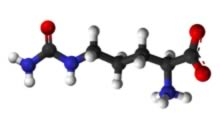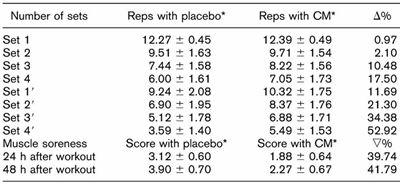L-Citrulline and L-Arginine Supplements
| Share on Facebook | Share on Twitter | Share on Google+ |
Citrulline is an amino acid the human body makes from ornithine, which the body in turn makes from arginine as it breaks down excess proteins to make urea that goes into the urine.
Scientists discovered citrulline about 80 years ago in watermelon rind, and citrulline supplements have been available for serious athletes since about 1980.
Citrulline appears in muscle, but when it's breaking down, not when it is being built up. Every bodybuilder knows, of course, that breaking down muscle fibers with a maximal load is essential at the process of muscle building and definition that is the goal of working out.
But does it make sense to take citrulline supplements to build muscle?
Research published in the Journal of Strength and Conditioning Research found that trained athletes who drank a beverage containing 8 grams of citrulline at least 60 minutes before a workout could do more repetitions of their weight training exercises than those who didn't.
The Citrulline Experiment
Scientists in Spain recruited 41 men to participate in the study. Each volunteer took part in two testing sessions, with a 7-day gap between the two tests.
The object of the test was to see how many repetitions of each weight the men could perform with and without drinking the citrulline beverage first.
The men each did 4 sets of a bench press, 4 sets of an inclined bench press, 4 flyes, and then 4 more sets of a bench press.
They all got the citrulline drink before the first test, but they did not get the drink before the second test.
Drinking the citrulline beverage before working out resulted in significantly greater endurance.

The effects of the beverage were not noticeable in the first set. But by the end of the test, citrulline was helping the men do nearly 53% more repetitions of the last weight. The volunteers also reported less muscle soreness 24 and 48 hours after their workout.
The scientists from Spain worked their volunteers hard and fast. They only got 1 minute between sets and 2 minutes between exercises.
This led one fitness expert, Christian Finn, to speculate that simply resting another minute between sets might have worked just as well. However, he tried the supplement himself and changed his mind.
And the Spanish scientists tested a "proprietary blend" that contained a lot of stuff other than just citrulline, such as caffeine, creatine, and beta-alanine. Six of the volunteers complained of stomach upset from the beverage.
Anecdotally, however, fitness coaches report that taking 6 to 8 grams of pure citrulline before a workout really does seem to give the benefits reported in the study.
Unfortunately, the scientific test was conducted with a product that is only available in the European Union and that won't work nearly as well if you don't stay hydrated during your workout (because of the creatine content).
We don't have scientific data supporting the use of citrulline without all the other ingredients. We just have anecdotal data.
Nonetheless, citrulline seems to be worth a try. But why not just take arginine?
L-Citrulline and L-Arginine as Sports Supplements
While the body makes citrulline out of arginine, taking supplemental arginine won't necessarily create more citrulline for your muscles. The reason for this is that the citrulline your body makes from arginine doesn't stay citrulline. The body further converts it to ornithine it stores in tissues until more arginine is needed.

Taking 5 to 10 grams of citrulline maleate added to the sports beverage of your choice at least an hour before working out may help you increase your reps and avoid muscle soreness.
It's certainly worth a try. Just avoid beverages that combine citrulline with sugar and caffeine, which you don't need before your workout. And remember, citrulline is pre-workout, not post-workout.
Reference:
Perez-Guisado J, Jakeman PM. (2010) Citrulline malate enhances athletic anaerobic performance and relieves muscle soreness. Journal of Strength and Conditioning Research, 24, 1215-1222.
-
Skin CareMen Skin Care
-
Free ResourcesFree eBooks
-
Health is not a condition of matter, but of Mind.Mary Baker Eddy
-
Featured Health Supplement
 ...a broad spectrum of around 80 of the nutrients that your body needs…including vitamins, minerals, trace elements, antioxidants,
amino acids, neuronutrients, bioflavonoids, carotenoids, herbal extracts, enzymes and other complementary co-factor ingredients.
...a broad spectrum of around 80 of the nutrients that your body needs…including vitamins, minerals, trace elements, antioxidants,
amino acids, neuronutrients, bioflavonoids, carotenoids, herbal extracts, enzymes and other complementary co-factor ingredients.
-



















